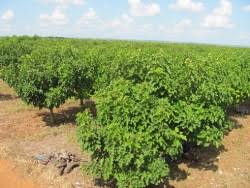DREAM OF CHEAP BIODIESEL NOW OVER
 The dream of producing cheap biodiesel from
the shrub jatropha is over, according to the Mozambican Ministry of Mineral
Resources and Energy.Under the previous government, led by President Armando
Guebuza, a great deal of hope was placed in jatropha. The plant grows readily
enough in Mozambique, and it was imagined that the production of biodiesel from
jatropha seeds might be a way of reducing Mozambique’s dependence on imported
fuels.Indeed, crushed jatropha seeds can produce high quality diesel, and the
plant has also been used to produce aircraft fuel. Several countries, including
Brazil and Pakistan, grew jatropha commercial, and produced diesel from it.But
in Mozambique, jatropha cultivation was on a small scale, and most farmers
declined the invitations to grow jatropha, preferring to concentrate in food
crops.
The dream of producing cheap biodiesel from
the shrub jatropha is over, according to the Mozambican Ministry of Mineral
Resources and Energy.Under the previous government, led by President Armando
Guebuza, a great deal of hope was placed in jatropha. The plant grows readily
enough in Mozambique, and it was imagined that the production of biodiesel from
jatropha seeds might be a way of reducing Mozambique’s dependence on imported
fuels.Indeed, crushed jatropha seeds can produce high quality diesel, and the
plant has also been used to produce aircraft fuel. Several countries, including
Brazil and Pakistan, grew jatropha commercial, and produced diesel from it.But
in Mozambique, jatropha cultivation was on a small scale, and most farmers
declined the invitations to grow jatropha, preferring to concentrate in food
crops.
 But the final nail in the jatropha coffin was
the sharp fall in oil prices. Cited in Thursday’s issue of the independent
daily “O Pais”, Almirante Dima, deputy national director of hydrocarbons in the
Ministry of Mineral Resources and Energy, pointed out that, at the height of
the enthusiasm for jatropha, a barrel of crude oil was selling for 130 US
dollars. There was talk that prices could reach 200 dollars a barrel.That would
certainly have made biodiesel from jatropha highly competitive. But, contrary
to the prophecies, the price of oil has tumbled. Dima said no-one would buy
biodiesel at 70 dollars a barrel, when conventional fuels cost 50 or 60 dollars
a barrel.“Nowadays it is not viable to use biodiesel because the cost of
producing it is higher than the cost of conventional fuels”, he said.The government had once planned to make it
compulsory to add biofuels to conventional fuels. As from 2012, fuel companies
were supposed to sell diesel that was a mixture of three per cent biodiesel and
97 per cent ordinary diesel. Petrol would be 10 per cent ethanol and 90 per
cent orthodox petrol. This measure, it was believed, would cut the annual fuel
import bill by 22 million dollars.But it never happened. Despite the announced
support of the Brazilian government, the project fell victim to the global
financial crisis, which halted funding for biofuel initiatives. In 2014, the then
National Director of Renewable Energies, Eusebio Saide, said the financial
crisis had blocked the development of the biofuel industry in Mozambique. Chances
of revival seem slim. Nowadays, the main alternative to imported liquid fuels
is Mozambique’s own natural gas, and the words “biofuel” and “jatropha” can no
longer be heard in official discourse.
But the final nail in the jatropha coffin was
the sharp fall in oil prices. Cited in Thursday’s issue of the independent
daily “O Pais”, Almirante Dima, deputy national director of hydrocarbons in the
Ministry of Mineral Resources and Energy, pointed out that, at the height of
the enthusiasm for jatropha, a barrel of crude oil was selling for 130 US
dollars. There was talk that prices could reach 200 dollars a barrel.That would
certainly have made biodiesel from jatropha highly competitive. But, contrary
to the prophecies, the price of oil has tumbled. Dima said no-one would buy
biodiesel at 70 dollars a barrel, when conventional fuels cost 50 or 60 dollars
a barrel.“Nowadays it is not viable to use biodiesel because the cost of
producing it is higher than the cost of conventional fuels”, he said.The government had once planned to make it
compulsory to add biofuels to conventional fuels. As from 2012, fuel companies
were supposed to sell diesel that was a mixture of three per cent biodiesel and
97 per cent ordinary diesel. Petrol would be 10 per cent ethanol and 90 per
cent orthodox petrol. This measure, it was believed, would cut the annual fuel
import bill by 22 million dollars.But it never happened. Despite the announced
support of the Brazilian government, the project fell victim to the global
financial crisis, which halted funding for biofuel initiatives. In 2014, the then
National Director of Renewable Energies, Eusebio Saide, said the financial
crisis had blocked the development of the biofuel industry in Mozambique. Chances
of revival seem slim. Nowadays, the main alternative to imported liquid fuels
is Mozambique’s own natural gas, and the words “biofuel” and “jatropha” can no
longer be heard in official discourse.
0 comentários:
Post a Comment